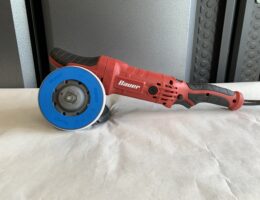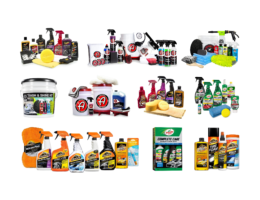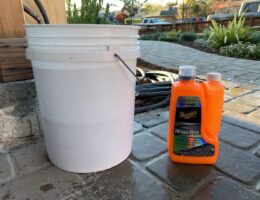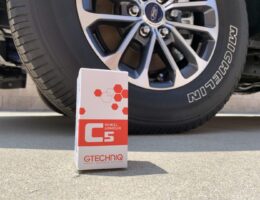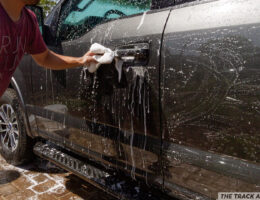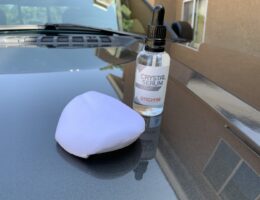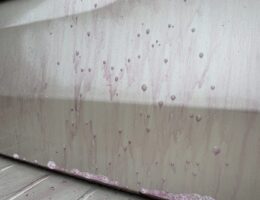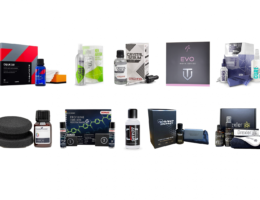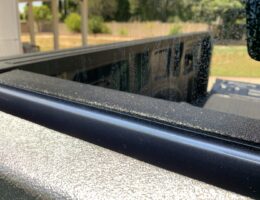A popular detailer on YouTube, Scott HD, has done an upgrade of the Bauer long throw polisher from Harbor Freight. He basically swaps out the grease with a lithium grease, and then changes out the backing plate with a more useable 5-inch backing plate made by Rupes. He has done some tests that show that the upgrade results in less vibration. These changes makes for a nice upgrade for the budget Bauer Long Throw Polisher from Harbor Freight.
The number of different car cleaning kits available is so vast since a car cleaning kit can be bundled with an endless combination or products and chemicals. To make matters more confusing, the amount of different products and chemicals available in the current car care market is overwhelming. So, I’ve put this list together to not only make it easier to understand why one kit may be better than the other, but to also help you understand why any particular kit is best for you.
Meguiar’s Hybrid Ceramic Wash and Wax is different from your traditional “wash ‘n wax” product that traditionally combines soap and wax into one. This product separates both car soap and wax into two separate chambers in its packaging: a larger one containing a low-sudsing soap to gently clean the vehicle, and a smaller one with the wax additive that exhibits excellent hydrophobic properties. This guide on how to use Meguiar’s Hybrid Ceramic Wash & Wax is intended to help supplement the provided instructions from Meguiar’s and to provide some helpful tips and tricks to getting the most out of this product based on my own experiences. A big thank you to Meguiar’s for providing this product for me to test and write about.
Gtechniq makes a wheel coating called C5 Wheel Armour that not only protects wheels (and brake calipers), but also minimizes brake dust and dirt from sticking to the surface that it is applied to. A wheel coating may differ from a ceramic coating due to its ability to withstand higher temperatures—temperatures that can be seen coming from the brakes of a car. In this post, I show the preparation and application of Gtechniq C5 Wheel Armour to a set of wheels, as well as how easy it is to wash later down the road.
So you’ve just ceramic coated your car or perhaps a car detailer ceramic coated your car for you. Now, you may be wanting to know how to wash and maintain it properly. Contrary to what some people may believe, ceramic coatings are not some mysterious product that needs extra special care. It simply just needs to be washed with proper wash techniques and with the right car wash products.
Ceramic coatings have become all the rage in recent years with quite a few options becoming available for the consumer market. These coatings form a very strong bond (on the nano scale) to your car’s paint leaving a layer of protection that is thicker and longer-lasting than your typical wax or paint sealant. Ceramic coatings offer protection against light scratches, corrosion, heat, chemicals, environmental effects, and industrial fallout. In addition to protection from the elements, ceramic coatings also offer superb hydrophobic properties which makes it much easier to wash your car.
Regardless of whether your car was maintained well or poorly, it is always wise to perform an iron decontamination (along with a mechanical decontamination) as preparation for a wax, sealant, or coating. The reason for this is that if you are going to apply an LSP (last step product) such as one of these mentioned, you don’t want to be sealing in any iron contaminants, which could continue eating through your paint. If you ever plan to apply a protective wax, sealant, or coating, consider doing an iron decontamination with an iron remover.
detailing enthusiasts. This data was pulled from various car detailing forums, as well as detailing-related Facebook Groups and detailing-oriented YouTube channels. By combining all of these reliable sources, I believe this list is largely comprehensive in identifying the best ceramic coatings available on the market today.
In this guide, I focus on using a plastic cleaner/polish called Meguiar’s PlastX. This product is generally used to polish plastics, but I’ve found it to be useful for mild hard water spots on glass that can’t be removed chemically. The level of abrasion with this formula is quite mild, so it has negligible effect on the clarity of the glass. You don’t even need to use a machine polisher, you can actually do all of this by hand with either a microfiber towel or a microfiber applicator pad (preferred). If you have a considerable amount of glass that needs water spot removal, then you might consider using a machine polisher, although you can still do it by hand; you just need a bit it of elbow grease.

